Tuesday Triage #39
- TUESDAY TRIAGE #39 by Vadim Drobinin
- On fermentation attempts
- Things I enjoyed reading
- 1. Facing Ka‘ena Point: On Turning Eighty by Paul Theroux
- 2. I Made A Mobile App for my Significant Other (And She Won't Use It) by @_joshuafonseca
- 3. Breakfast at Bäckerei Frank
- 4. Among the Rank and File by Jennifer Wilson
- 5. The True Meaning of Technical Debt by Luca Rossi
- 6. Fighting brain drain and creeping authoritarianism in Russia’s techno-utopian village by @leonidragozin
- 7. Meaning in the Margins: On the Literary Value of Annotation by Remi Kalir and Antero Garcia
- 8. The Unlikely Rise of the French Tacos by @laurenzcollins
- 9. Prince Philip: An extraordinary man who led an extraordinary life by Jonny Dymond
- 10. Understanding Media Through Food: 8 Metaphors by @pratik_is_
- Things I didn't know last Tuesday
- 1. Manx cat
- 2. 1858 Bradford sweets poisoning
- 3. Danny DeVito voiced himself in languages he didn't know
- 4. Human taste buds can tell normal water from "heavy" water
- 5. Zostera marina
- 6. Icelandic horse
- 7. Why cats and dogs turn around lying down
- 8. Vegan diets are adding to malnutrition in wealthy countries
- 9. Oyster mushrooms are carnivorous
- 10. The Italian government is giving teens 500 euros on their 18th birthday to spend on books
- Book of the week
- Thank you and see you in a week!
TUESDAY TRIAGE #39
by Vadim Drobinin ¶
Your weekly crème de la crème of the Internet is here!
13.04.2021 (read in browser)
On fermentation attempts ¶
For a while I've been avoiding fermentation as a concept.
I would still eat fermented food, and occasionally pickle some tomatoes, but I didn't buy the idea of raising a sourdough, or constantly feeding kombucha, or keeping numerous jars with lactofermented things here and there.
This week I thought I'd look into whatever has been missed so far, and did a few shy attempts at fermenting.
My very first try was tepache, something between kombucha and beer, but pineapple based.
It involves making a piloncillo syrup:
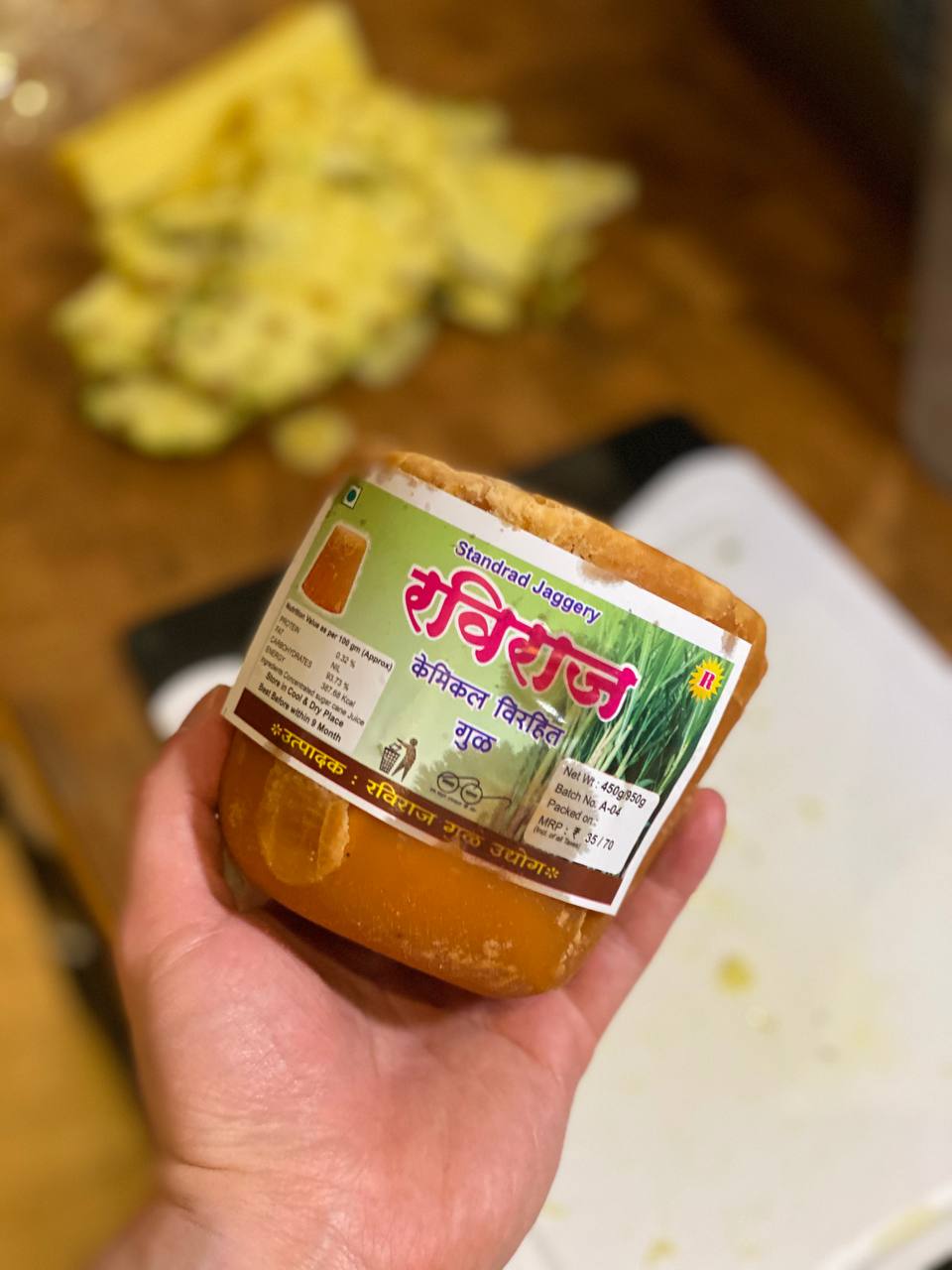
And then infusing with spices, and unedible parts of a pineapple (i.e rinds and the core):

It is still fermenting, so in a few days I will get it bottled and eventually carbonated to use in riffs on Aperol Sprits and Negroni.
The fruits were dehydrated into crisps; makes for a fancy garnish, but I am still doubting it justifies the amount of space a dehydrator takes. Maybe I should send it back and get an industrial-grade ice-cream machine instead?
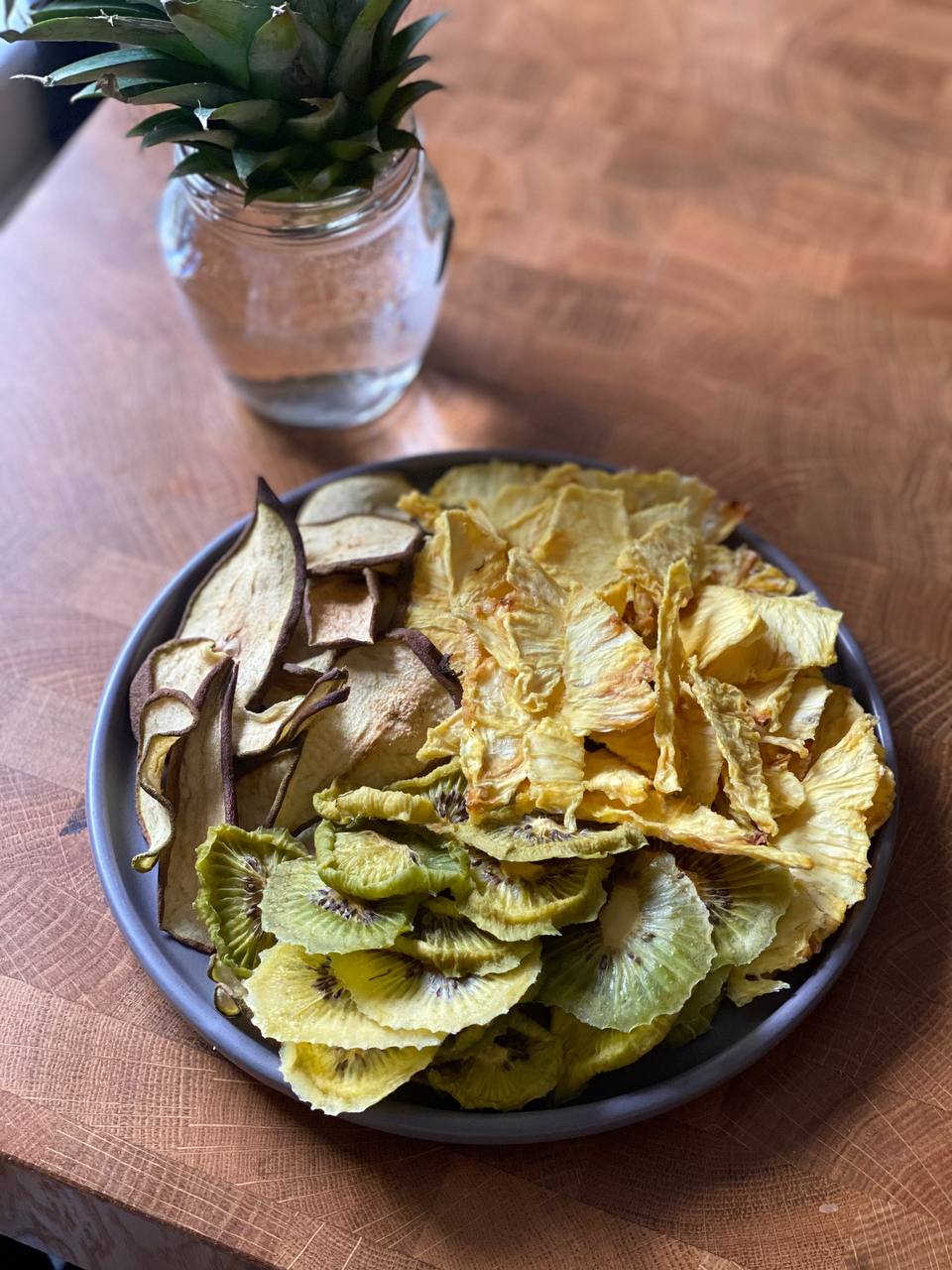
Also given our consumption of coffee, we started a batch of coffee kombucha based on Noma's recipe:
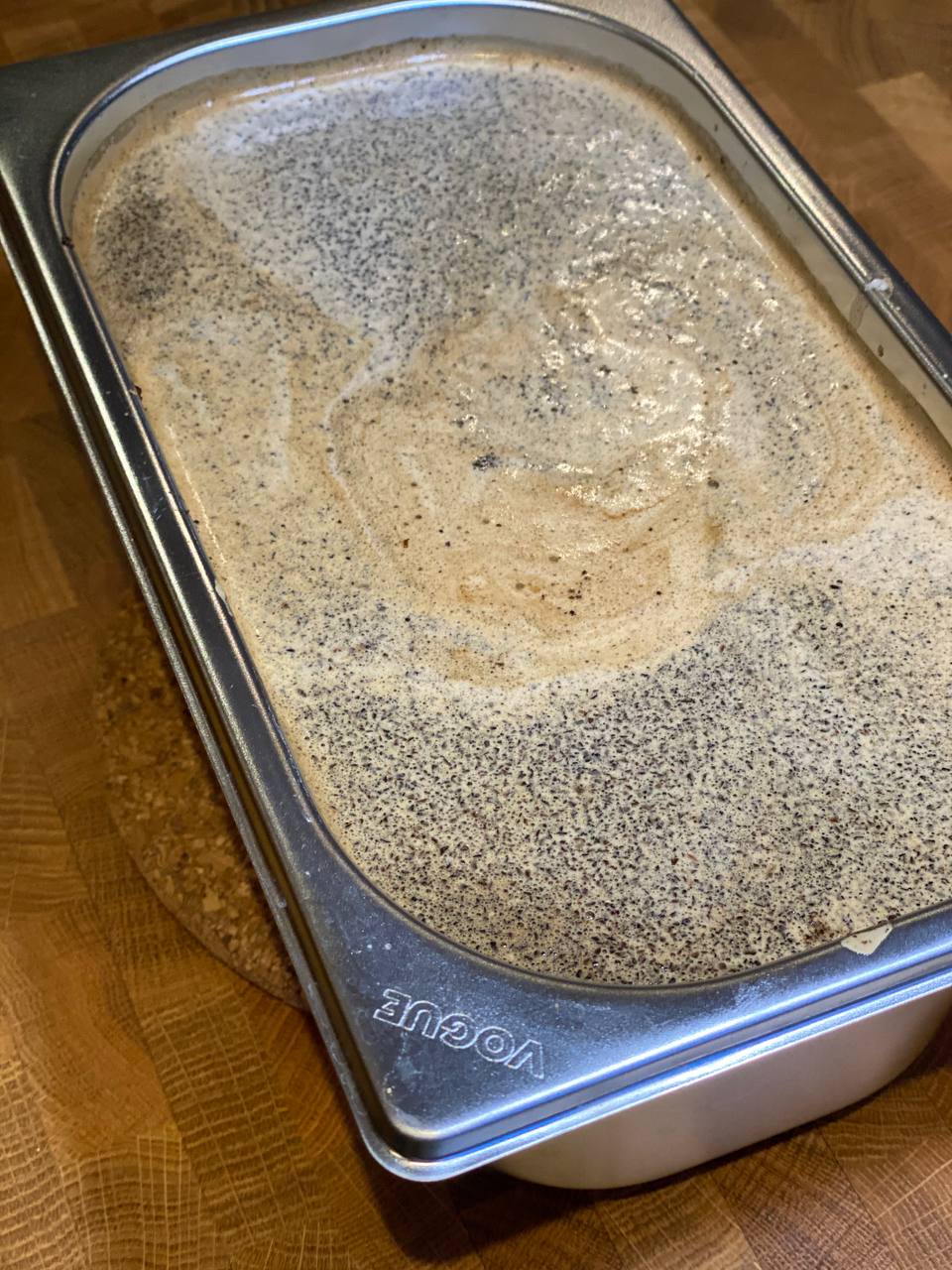
Again, it will take another week or so to drop its pH to a proper level, but so far looks good.
And just today I tried to make a bubble tea for the second time in my life.
It turned out to be a disaster (again!), but soaking tapioca pearls in sugar and honey syrup, and dilute the tea with evaporated milk helped to some extent.
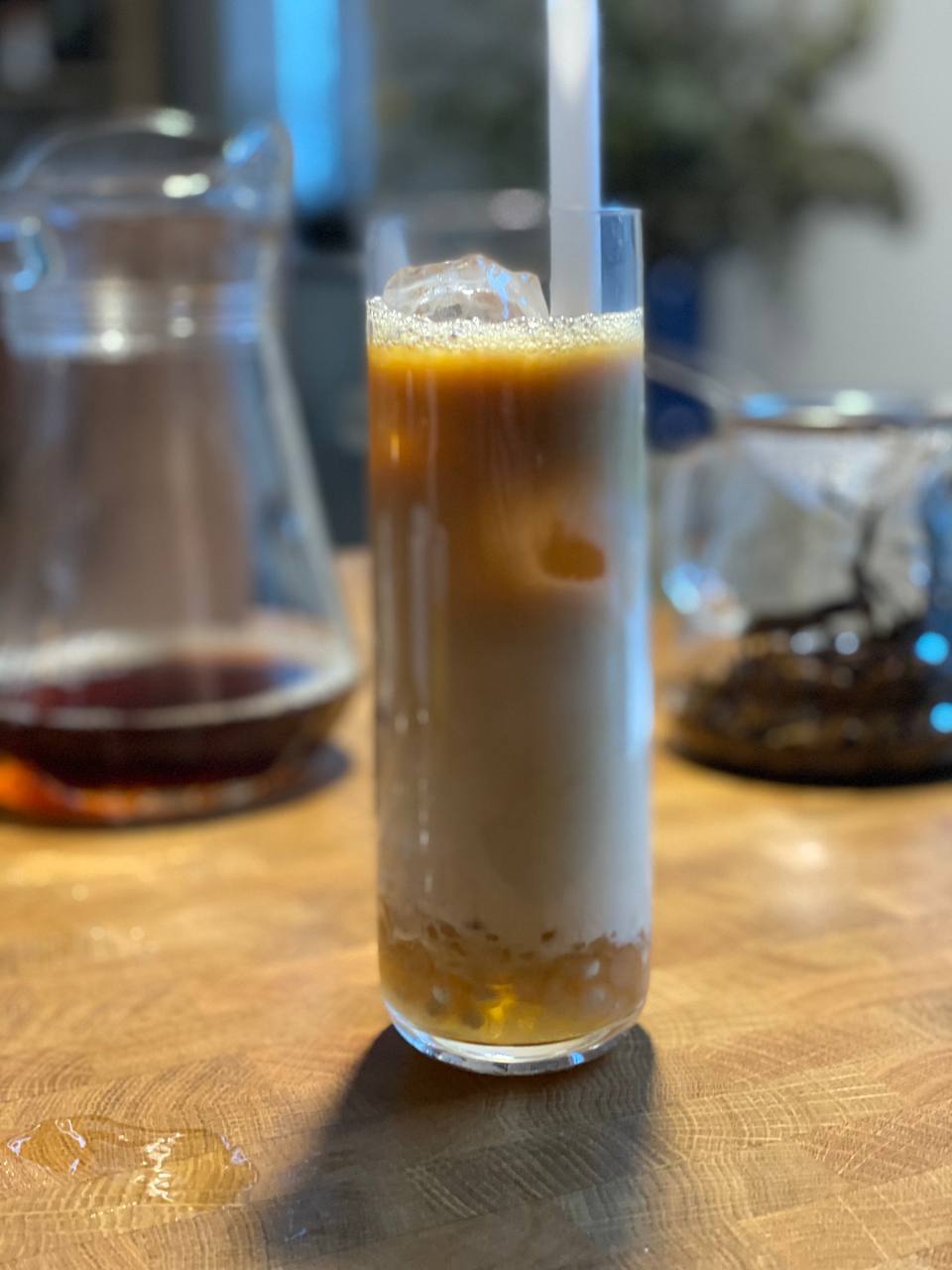
Next time I will just make a smaller batch, maybe that's the secret.
Things I enjoyed reading ¶
1. Facing Ka‘ena Point: On Turning Eighty by Paul Theroux ¶
I am becoming older in a few days, and it got me into partly nostalgia, partly conscious vibes, and this article reflects both very well:
It is not the big number—eighty—that shocks me (though I sometimes gulp when I utter it), but, rather, the banal image of an implacable hourglass, most of its sand heaped at the bottom, the last negligible pinch of grains sifting down, unstoppable, a finite amount, less each time I look. I tell myself that, at this point in my life, my age has no meaning. My routines have hardly changed. I have been writing one book after another since about 1963, thirty-two of fiction, twenty nonfiction, and a play about Rudyard Kipling’s disastrous four years in Vermont.
Many consider writing an autobiography in some form the closer they get to the peak of their thinking power; I wrote mine years back, at its very beginning.
People occasionally remind that it didn't make me rich, but that was never the point.
The legacy of one's work is getting accumulated over years, and yet putting something out there as early as possible is akin to the first pancake: not necessarily a disaster but could definitely be improved, and yet makes you worry way less about further attempts as they will be only getting better.
2. I Made A Mobile App for my Significant Other (And She Won't Use It) by @_joshuafonseca ¶
A great idea and something I would definitely use quite often:
Honestly, building the app was the least time intensive, which became a point of frustration for me. It took me 2-3 weeks to build out the app to a point where it worked (with the exception of minor bug fixes).
Really sad that it didn't work for the only early adopter it was targeting.
3. Breakfast at Bäckerei Frank ¶
Recently I read about a hassle of searching for a perfect bagel in London.
Here is an interesting overview of Germans' obsession with pretzels, and caveats of finding one in the States:
I'm assuming this is what he said, of course, because my German wasn't really good enough at that point to understand all of it. He said this once, and I didn't quite understand, so I proceeded to close the bag with my warm pretzels inside. At which point, he said it again and motioned to me to open the bag. Then I understood. He cared that much about the quality of the pretzels when I arrived home with them.
4. Among the Rank and File by Jennifer Wilson ¶
Those enjoying Russian writers sans Tolstoy as much as I am, already had a chance to meet one of the best English translators, Fusso.
Not much has changed since: Gogol is still pretty much impossible to translate properly, but worth trying.
“Gogol’s language is indeed distinctive,” Fusso writes in her introduction, “whether because of his Ukrainian-Russian bilingualism or his eccentric personality or some combination of factors.” It is why he is “accordingly known as one of the most untranslatable of Russian writers.” In a move that preserves a sense of foreignness in the English translation, Fusso employs something closer to a literal translation than the more idiomatic one used by Richard Pevear and Larissa Volokhonsky in their 2011 rendering of Gogol’s stories.
5. The True Meaning of Technical Debt by Luca Rossi ¶
I definitely second this:
He doesn't talk of poor code — which he says accounts for a very minor share of debt.
He talks of disagreement between business needs and how the software has been written.
Technical debt is an umbrella of a word, and many people tend to cover up poor architecture decisions under something more pleasant, like refactoring, but that is rarely true.
Refactoring simplifies developers' life, while technical debt makes it more complicated. These two are not mutually exclusive though, so the former might reduce the chances of the latter, but it is not always the case.
6. Fighting brain drain and creeping authoritarianism in Russia’s techno-utopian village by @leonidragozin ¶
Here is a hilarious look into a piece of land relatively close to my hometown, and its utopian vibes with self-driving taxis and people dreaming of running away.
The rover was one of seven in a pilot food delivery program — a modest fleet but enough to cover the needs of one of Russia’s smallest towns, whose local restaurant scene includes a fancy Italian bistro, a pan-Asian lunch place, a gourmet burger outfit, and a shawarma joint. The latter, according to a spokeswoman for the pilotless vehicle program, is the most popular option.
The last time I've been to Innopolis, it wasn't on maps yet, so there was no way to get a taxi to get out of the city.
At least that is now fixed.
7. Meaning in the Margins: On the Literary Value of Annotation by Remi Kalir and Antero Garcia ¶
This is an enlightening dive into history of books, words, and writings on margins:
Annotation can furnish information—and annotation can be perceived by readers and other annotators as valuable—when notes added to texts are capable of being put to good use, exhibiting relevance, and addressing needs or curiosities. Annotation can limn texts when these “silent embers” illuminate knowledge that is useful, relevant, and timely.
It's really unusual to think of annotations as something that has very strict rules to it, and affects different readers in different ways, and yet that's the whole purpose of the author here.
8. The Unlikely Rise of the French Tacos by @laurenzcollins ¶
Probably a year ago or so I've passed by a feshly opened place with French Tacos next to my previous flat, and was quite flabbergasted by this oxymoron, especially given that their menu had something akin to a shawarma.
At around five euros for the simplest version, the French tacos offers an attractive cost-to-calorie ratio. It satisfies hunger for hours, in the manner of peasant cooking, while coming off as cool and new. Bastien Gens, the director of “Tacos Origins,” a documentary about the French tacos, told me that, as “the most exacerbated junk food,” the tacos has a certain rebellious aura. “There’s an insolence,” he said, characterizing it as a rebuttal to the bobo interest in virtuous eating. “You’re in the realm of the forbidden.”
Apparently in France that's the new mussels and fries, but better.
Can't blame them, that's for sure.
9. Prince Philip: An extraordinary man who led an extraordinary life by Jonny Dymond ¶
There must be better sources out there, but this article, probably prepared years ago, was a pleasure to read. I never thought of Prince Philip as someone with such an intense life, always assuming his role as the Queen's shadow.
His grandfather was the King of Greece; his great-aunt Ella was murdered along with the Russian tsar, by the Bolsheviks, at Ekaterinberg; his mother was a great-granddaughter of Queen Victoria.
His four older sisters would all marry Germans. While Philip fought for Britain in the Royal Navy, three of his sisters actively supported the Nazi cause; none would be invited to his wedding.
Politics aside, that's something worth reading.
10. Understanding Media Through Food: 8 Metaphors by @pratik_is_ ¶
An unusual way to explain media concepts (which are hard) via food concepts (which are simple).
Won't make you feel better about spending hours on Instagram, but at least will bring something new:
When our metabolism is glucose-adapted, it’s difficult for us to metabolize fat appropriately. Similarly, when we only consume highly engaging short-form information, our bodies become adapted to running on this form of energy. It then becomes increasingly harder to metabolize other forms of information. I marvel sometimes at how I was able to read all 7 Harry Potter books when I was younger. I can’t imagine even reading half of one book today. To force a metaphor, this is because I’ve “fallen out of ketosis”.
Things I didn't know last Tuesday ¶
1. Manx cat ¶
The Isle of Man must be a nice place to visit, partly due to its fauna:
Tailless cats, then called stubbin (apparently both singular and plural) in colloquial Manx language, were known by the early 19th century as cats from the Isle of Man, hence the name, where they remain a substantial but declining percentage of the local cat population.
They also have sheep with four horns.
2. 1858 Bradford sweets poisoning ¶
And that's why I don't trust food stalls... anymore.
The 1858 Bradford sweets poisoning was the arsenic poisoning of more than 200 people in Bradford, England, when sweets accidentally made with arsenic were sold from a market stall. Twenty-one victims died as a result.
3. Danny DeVito voiced himself in languages he didn't know ¶
Danny DeVito dubbed himself in Russian, German, Italian, Catalan and Castilian Spanish without knowing those languages:
Working with two coaches in each language, DeVito says the process was exhilarating but daunting. After finishing the Russian version, he says, “I had the feeling of what it must be like when people say they want to climb Mount Everest. They get to that plateau where people don’t go any farther—you get up to that spot and you go, ‘Holy sh-tballs, am I really doing that?’
Must be quite a fun experience, especially for those knowing the language in question.
4. Human taste buds can tell normal water from "heavy" water ¶
In a taste-testing experiment with 28 participants, most people were able to distinguish between H2O and D2O, and tests with mixed amounts of the waters revealed that greater proportions of heavy water were perceived as tasting sweeter.
Now I am wondering if that's good or bad, as some of the best brands of bottled water I had were definitely sweeter than the water I usually drink.
5. Zostera marina ¶
A famous chef found something reminiscent of rice grains under the water and (obviously) turned it into flour, puddings, and side dishes.
Lab tests hinted at its tremendous potential: gluten-free, high in omega-6 and -9 fatty acids, and contains 50% more protein than rice per grain, according to Aponiente’s research. And all of it growing without freshwater or fertiliser.
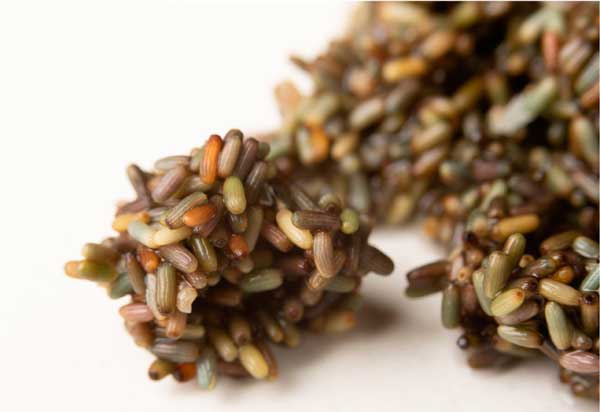
6. Icelandic horse ¶
Horses from Iceland are not allowed to leave the country; if they do, they are not allowed to return back.
As a result, native horses have no acquired immunity to disease; an outbreak on the island would be likely to be devastating to the breed. This presents problems with showing native Icelandic horses against others of the breed from outside the country, as no livestock of any species can be imported into Iceland, and once horses leave the country they are not allowed to return.

7. Why cats and dogs turn around lying down ¶
There are actually a few options in the post, this one sounds quite interesting:
They positioned themselves in the most advantageous manner to keep a close watch on their environment. They circled until they positioned themselves according to wind patterns that would allow them to quickly pick up on the scent of an intruder.
The most straightforward one is that they disturb the ground to make sure there are no hidden bugs, snakes, etc which might kill them during their sleep. Sounds legit too.
8. Vegan diets are adding to malnutrition in wealthy countries ¶
Something I always suspected:
Bone health is a concern for long-term vegans. Vegans are consistently reported to have lower intakes of calcium and vitamin D, with resultant lower blood levels of vitamin D and lower bone mineral density reported worldwide. Fracture rates are also nearly a third higher among vegans compared with the general population.
A mandatory disclaimer: although I don't trust people who don't eat medium-rare steaks, this is more about poorly planning one's meatless diet. However I must say, if you want a bullet-proof solution, just get some real meat.
9. Oyster mushrooms are carnivorous ¶
Who would think that one of the most common mushrooms out there actually eat meat?
Oyster mushrooms poison and paralyze nematodes within minutes of contact, inject their filaments into the corpses, dissolve the contents and absorb the slurry.
That sounds cool enough to start planning to grow some in our garden.
10. The Italian government is giving teens 500 euros on their 18th birthday to spend on books ¶
That's a nice touch, although seems like other countries in Europe (namely, France) have a similar scheme.
Some 575,000 teenagers are expected to benefit from the scheme, and though it will cost the Italian government 290 million euros, parliamentary undersecretary Tommaso Nannicini believes it is money well spent.
Wonder what are the books they usually get? Is there any statistics? Do digital copies count?
Book of the week ¶
I've been slowly going through The Year of Eating Dangerously by Tom Parker Bowles for a while now.
Like a good wine, it needs to be portioned ahead, and enjoyed in the moments of indulging in enjoyable recollection of past travels, like a temporary cure:
In England, I can bang on all day about the lemon or Tabasco on oysters debate (I’m with both, but in minute quantities). Here, I’m well out of my depth. The sea urchin pasta is more decadent still, intensely smooth and rounded, a fiesta of overexcited hyperbole. It’s like the warm, scented breath of a mermaid, more evocative than strident, each bite giving just a far-off whisper of the sea. The ingredients are so fresh as to need little embellishment and Luca is still amazed at the vibrancy of the new Sicily.
At least it is a great reminder that any travel boils down to food and people.
Places rarely matter more than a simple background. They might be nice explore, but they are rarely the things one remembers years later.
Thank you and see you in a week! ¶
If you have any questions, or want to suggest a link for the next newsletter, please drop me a message on Twitter or reply to this email.
Cheers! 🍸
